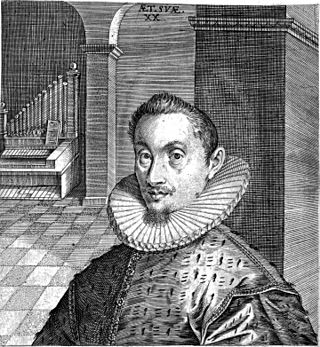Related Research Articles
Giaches de Wert was a Franco-Flemish composer of the late Renaissance, active in Italy. Intimately connected with the progressive musical center of Ferrara, he was one of the leaders in developing the style of the late Renaissance madrigal. He was one of the most influential of late sixteenth-century madrigal composers, particularly on Claudio Monteverdi, and his later music was formative on the development of music of the early Baroque era.

Costanzo Festa was an Italian composer of the Renaissance. While he is best known for his madrigals, he also wrote sacred vocal music. He was the first native Italian polyphonist of international renown, and with Philippe Verdelot, one of the first to write madrigals, in the infancy of that most popular of all sixteenth-century Italian musical forms.

Hans Leo Hassler was a German composer and organist of the late Renaissance and early Baroque eras, elder brother of less known composer Jakob Hassler. He was born in Nürnberg and died in Frankfurt am Main.
Hieronymus Praetorius was a Northern German composer and organist of the late Renaissance and early Baroque whose polychoral motets in 8 to 20 voices are intricate and vividly expressive. Some of his organ music survives in the Visby Orgel-Tabulatur, which dates from 1611.
The chorale motet was a type of musical composition in mostly Protestant parts of Europe, principally Germany, and mainly during the 16th century. It involved setting a chorale melody and text as a motet.
Johann Christoph Demantius was a German composer, music theorist, writer and poet. He was an exact contemporary of Monteverdi, and represented a transitional phase in German Lutheran music from the polyphonic Renaissance style to the early Baroque.
Giovanni de Macque was a Netherlandish composer of the late Renaissance and early Baroque, who spent almost his entire life in Italy. He was one of the most famous Neapolitan composers of the late 16th century; some of his experimentation with chromaticism was likely influenced by Carlo Gesualdo, who was an associate of his.

Andreas Hammerschmidt, the "Orpheus of Zittau," was a German Bohemian composer and organist of the early to middle Baroque era. He was one of the most significant and popular composers of sacred music in Germany in the middle 17th century.
The year 1625 in music involved some significant events.
The year 1613 in music involved some significant events.
The year 1609 in music involved some significant events.
Jacob Regnart was a Flemish Renaissance composer. He spent most of his career in Austria and Bohemia, where he wrote both sacred and secular music.
Gallus Dressler was a German composer and music theorist who served as Kantor in the church school at Magdeburg. Though a few of his works have remained in the choral repertoire, he is best known for his theoretical writings, especially his Praecepta musicae poeticae, which contains some of the earliest detailed description of the compositional process of the Renaissance motet.
Manfred Cordes is a German conductor of early music, musicologist and teacher. He is professor at the Hochschule für Künste Bremen and was its rector from 2007 to 2012.
Orfeo Vecchi was an Italian composer and choirmaster. His most important appointment as choirmaster was at Santa Maria alla Scala, Milan. His earliest extant compositions date from 1588.
Mattheus Le Maistre or Matthaeus Le Maistre was a Flemish Renaissance choirmaster and composer who is best known for his time in Dresden. His music was superior but in no way progressive, influential in both Counter-Reformation and Lutheran courts.
Andreas Raselius, also known as Andreas Rasel was a German composer and kapellmeister during the Renaissance. He worked for much of his career as a teacher and cantor in Regensburg, before being appointed as the court conductor of the Elector Palatine in Heidelberg. He is today best noted as the author of a cycle of motets for use throughout the year, the first such cycle to be composed in the German language, which was published in 1594.
Leonhardt Schröter was a German Renaissance choirmaster, teacher, and composer at Magdeburg.
References
- 1 2 3 4 5 Slonimsky, Nicolas, ed. (2001). Baker's Biographical Dictionary of Musicians. Vol. 5. Schirmer Books. ISBN 0-02-865530-3.
- 1 2 3 4 Sadie, Stanley, ed. (2001). The New Grove Dictionary of Music and Musicians. Vol. 20. Grove Dictionaries, Inc. p. 260. ISBN 1-56159-239-0.
- 1 2 Pratt, Waldo Selden (1907). The History of Music. New York: G. Schirmer, Inc. p. 131.